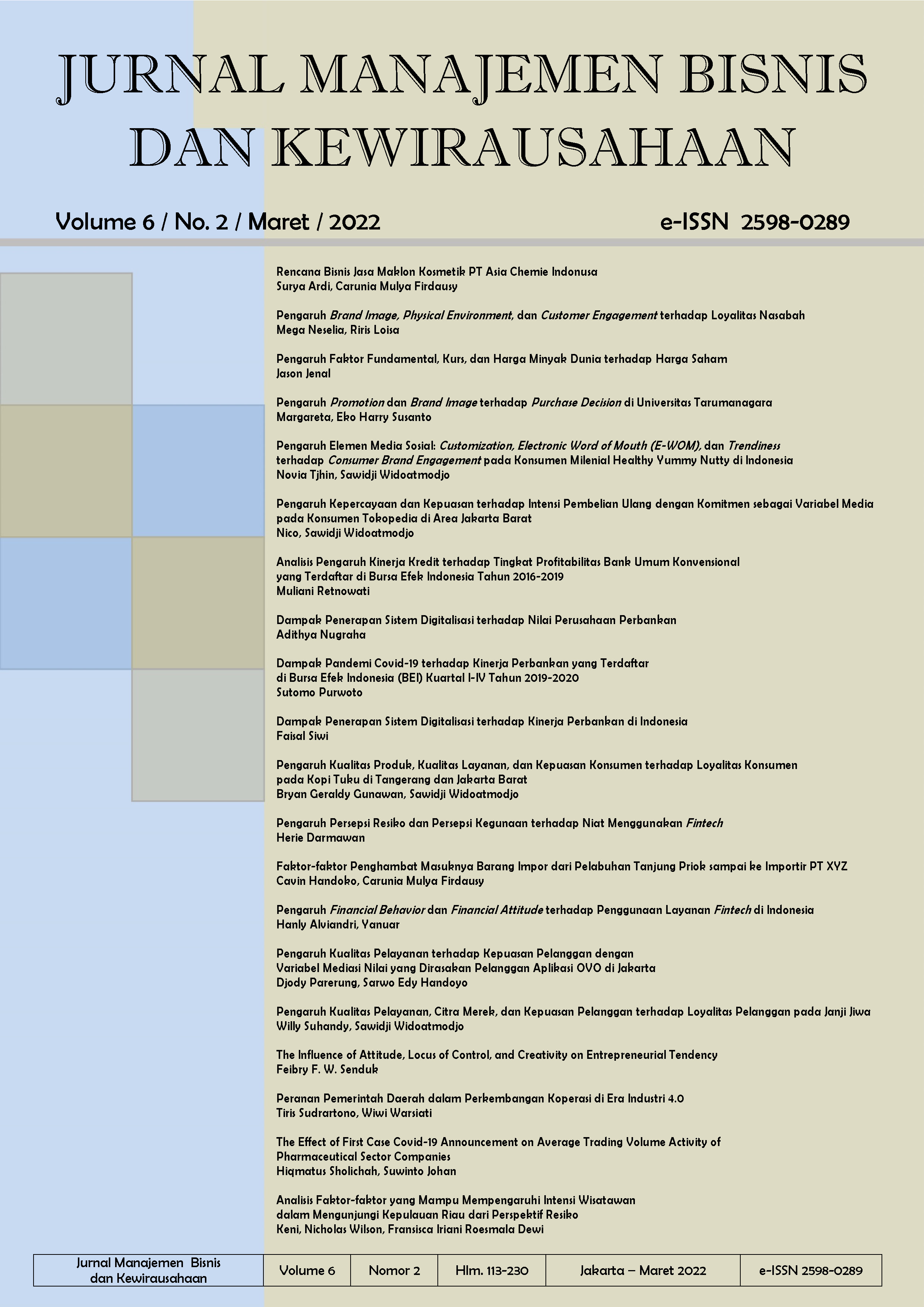Pengaruh Kepercayaan dan Kepuasan terhadap Intensi Pembelian Ulang dengan Komitmen sebagai Variabel Media pada Konsumen Tokopedia di Area Jakarta Barat
Main Article Content
Abstract
The purposes of this study are to explore the among trust and satisfaction on influence repurchase intention, to explore the among trust and satisfaction on influence commitment and also to explore the commitment on influence repurchase intention, and find out if commitment can mediate trust and satisfaction on influence repurchase intention. The population of this research is all Tokopedia customers in Jakarta Barat. The samples of this research are 200 respondents by online questionnaire with the nonprobability sampling technique with convenience sampling. The technique of data analysis used in this study was PLS analysis and mediating test to examine the hypotheses. The results are: (a) trust and satisfaction have positively influence repurchase intention; (b) trust and satisfaction have positively influence commitment; (c) commitment has positively influence repurchase intention; (d) Commitment mediate the trust and satisfaction on influence repurchase intention.
Tujuan dari penelitian ini adalah untuk meneliti terdapat pengaruh dari kepercayaan dan kepuasan terhadap intensi pembelian ulang, kemudian untuk meneliti terdapat pengaruh dari kepercayaan dan kepuasan terhadap komitmen lalu untuk meneliti terdapat pengaruh komitmen terhadap intensi pembelian ulang dan untuk meneliti terdapat pengaruh dari kepercayaan pelanggan dan kepuasan pelanggan terhadap intensi pembelian ulang yang dimediasi oleh komitmen. Populasi dari penelitian ini adalah seluruh konsumen Tokopedia di Jakarta Barat. Sampel yang dibutuhkan dalam penelitian ini adalah 200 responden dengan menggunakan metode kuesioner daring didampingi dengan teknik nonprobability sampling. Teknik analisa data yang digunakan adalah Analisa PLS dengan memediasi percobaan untuk mendapatkan hipotesis. Hasilnya adalah sebagai berikut: a) Kepercayaan dan Kepuasan secara positif mempengaruhi Intensi Pembelian Ulang. b) Kepercayaan dan Kepuasan secara positif mempengaruhi Komitmen. c) Komitmen secara positif mempengaruhi Intensi Pembelian Ulang d) Komitmen memediasi Kepercayaan dan Kepuasan dalam mempengaruhi Intensi Pembelian Ulang.
Article Details
Section
This work is licensed under a Jurnal Manajemen Bisnis dan Kewirausahaan Creative Commons Attribution-ShareAlike 4.0 International License.
How to Cite
References
Arnott, D. C. (2007). Trust - Current thinking and future research. European Journal of Marketing, 41(9–10), 981–987. https://doi.org/10.1108/03090560710773291
Baptista, G., & Oliveira, T. (2015). Understanding mobile banking: The unified theory of acceptance and use of technology combined with cultural moderators. Computers in Human Behavior, 50, 418–430. https://doi.org/10.1016/j.chb.2015.04.024
Blackwell, R. D., Miniard, P. W., & Engel, J. F. (2001). Consumer behavior. Harcourt College Publishers.
Cater, B., & Zabkar, V. (2009). Antecedents and consequences of commitment in marketing research services: The client’s perspective. Industrial Marketing Management, 38(7), 785–797. https://doi.org/10.1016/j.indmarman.2007.10.004
Erci?, A., Ünal, S., Candan, F. B., & Y?ld?r?m, H. (2012). The effect of brand satisfaction, trust and brand commitment on loyalty and repurchase intentions. Procedia - Social and Behavioral Sciences, 58, 1395–1404. https://doi.org/10.1016/j.sbspro.2012.09.1124
Hong, I. B., & Cho, H. (2011). The impact of consumer trust on attitudinal loyalty and purchase intentions in B2C e-marketplaces: Intermediary trust vs. seller trust. International Journal of Information Management, 31(5), 469–479. https://doi.org/10.1016/j.ijinfomgt.2011.02.001
Kotler, P., & Keller, K. L. (2016). Marketing management (15th ed.). Pearson Education.
Li, X., & Petrick, J. F. (2008). Examining the antecedents of brand loyalty from an investment model perspective. Journal of Travel Research, 47(1), 25–34. https://doi.org/10.1177/0047287507312409
MacMillan, K., Money, K., Downing, S., & Hillenbrand, C. (2005). Reputation in relationships: Measuring experiences, emotions and behaviors. Corporate Reputation Review, 8(3), 214–232. https://doi.org/10.1057/palgrave.crr.1540251
Martenson, R. (2007). Corporate brand image, satisfaction and store loyalty: A study of the store as a brand, store brands and manufacturer brands. International Journal of Retail and Distribution Management, 35(7), 544–555. https://doi.org/10.1108/09590550710755921
Miner, J. B. (1992). Industrial-organizational psychology. McGraw-Hill.
Moorman, C., Deshpande, R., & Zaltman, G. (1993). Factors affecting trust in market research relationships. Journal of Marketing, 57(1), 81–101. https://doi.org/10.2307/1252059
Rahman, K. U., Akhter, W., & Khan, S. U. (2017). Factors affecting employee job satisfaction: A comparative study of conventional and Islamic insurance. Cogent Business and Management, 4(1), 1–15. https://doi.org/10.1080/23311975.2016.1273082
Tokopedia. (2019). Cerita Tokopedia: Lebih banyak tentang perjalanan kami. Tokopedia.Com. https://www.tokopedia.com/about/our-story
Trivedi, S. K., & Yadav, M. (2018). Predicting online repurchase intentions with e-satisfaction as mediator: a study on Gen Y. VINE Journal of Information and Knowledge Management Systems, 48(3), 427–447. https://doi.org/10.1108/VJIKMS-10-2017-0066


